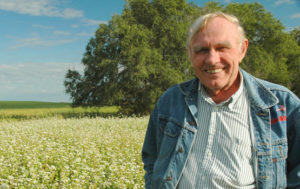Dear Friends,

Climate March mobile “bathrooms” — complete with showers and commodes
Just like planet Earth, preparations for the First Nation – Farmer Climate Unity March are heating up. This past weekend, Sarah Spain and Chap Myers scouted the route between Des Moines and Fort Dodge. We’re now closing in on locating the seven campsites we’ll need for the September 1 – 8 march.
Also, Sarah and her brother, Sean, are working on improvements to our “Mobile Bathroom” unit — a trailer that hauls both environmentally friendly commodes and solar showers. Besides the trailer’s functional importance, it showcases the technologies that will lead us beyond climate chaos into a sustainable future.
We’re thrilled that Lyssa Wade — a.k.a., Veggie Thumper — will provide food for our hungry marchers and guests each night of the March. Lyssa needs someone to repair her bus’s refrigerator. If you’ve got expertise in that area, or know of someone who does, please get in touch with me.

Lyssa Wade and the “Veggie Thumper” bus
As if to underscore the urgency of the March, BNSF Railway recently spilled upwards of 230,000 gallons of tar sands oil (the worst of the worst) into the Little Rock River, just a few miles from where Bakken oil flows through the Dakota Access Pipeline in Lyon County, Iowa. Mahmud Fitil shot some excellent video of the oil spill. That inspired Krystle Craig to take water samples at seven locations — from just upstream of the spill to Omaha. Here’s video footage of Krystle’s work. From everything we’ve seen, the spill appears to be worse than railway officials are willing to admit. Stay tuned for more.

David Houston with Homes4MyPeeps
Back to the March. I’m excited about the commitment, passion, and diversity of those stepping forward to join the March. David Houston of Des Moines understands the connection between climate change, food, and the challenges facing low-income communities. He writes, “I’ve never done a march, but this seems like a good way to get connected. I run Homes4MyPeeps to restore homes for low-income people. Part of what I do involves growing and eating good, healthy food. People need to start thinking about what they eat, because when we eat better and put the right fuel into our systems, we feel better, too.”

Trisha Etringer
Trisha Etringer is a Hochunk woman from Cedar Falls. She writes, “I’m marching for Indigenous rights, landowner rights, and clean water for my children. They and other children deserve clean water and a healthy way of living. I’m majoring in psychology and minoring in mental health at UNI. My experience at Standing Rock was eye opening. My time there woke me up to the importance of fighting to protect Mother Earth. I had never done anything like that in my life and was pregnant at the time. If I’d not gone to Standing Rock I’m not sure where I’d be today.”
Fred Kirschenmann is a life-long farmer who’s joining the March for the first four days. He writes, “I grew up on a farm in North Dakota under the tutelage of a father who developed a passion, as a result of the dust bowl in the 1930s, about how important it was to ‘take care of land.’ He instilled that value in me, so it has also become a passion of mine. During my life-time its importance has only increased in me.”

Fred Kirschenmann
This March is important for so many reasons, especially with the landowner/Sierra Club lawsuit coming before the Iowa Supreme Court in September. We can accommodate fifty marchers each day. If you’d like to join us, please visit the First Nation – Farmer Climate Unity March where you’ll find an application, a FAQ sheet, our Code of Nonviolence, a link to the marcher profile page, and more.
Thanks! – Ed Fallon
